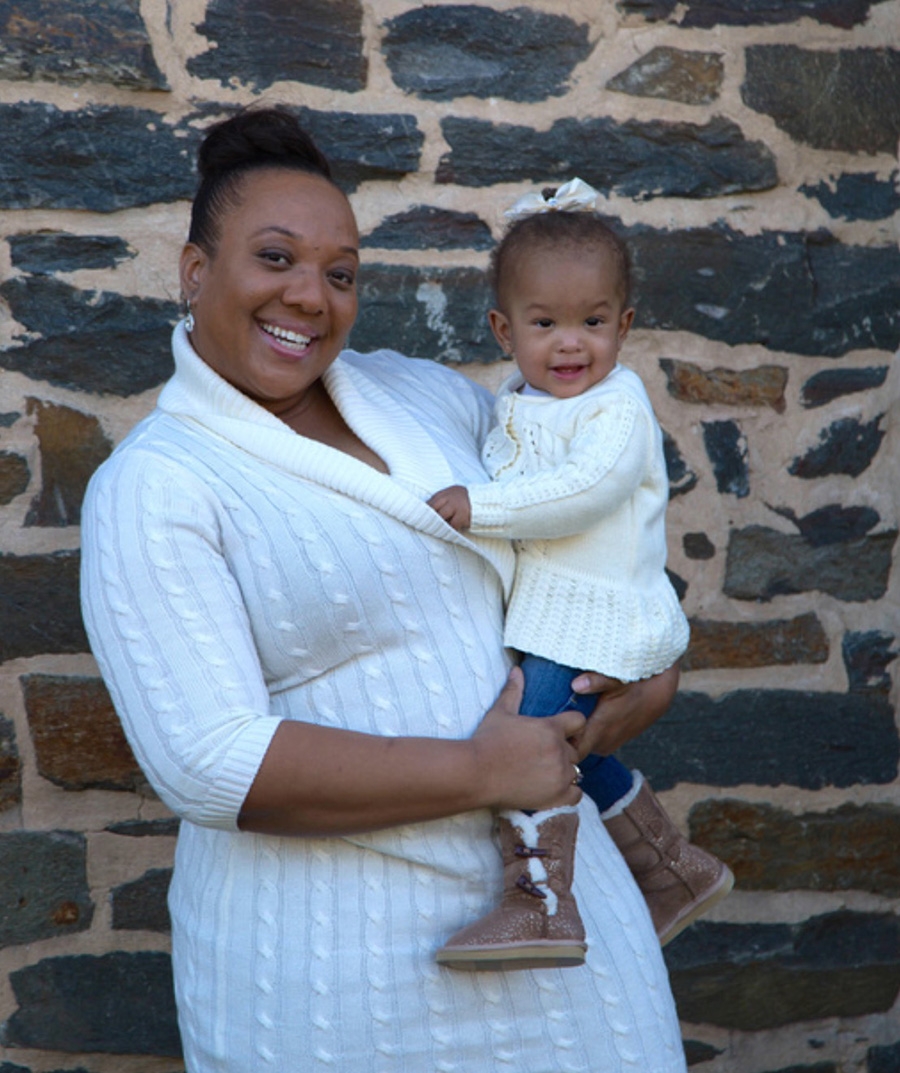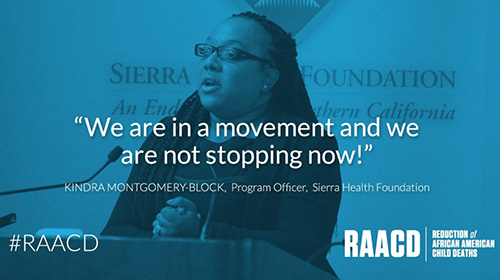
by Staff Writer, Donna Michele Ramos
Tragically, in Sacramento County African American children die at very disproportional rates, two times the rate of other children. In 2013, following the Blue Ribbon Commission Report, the Sacramento County Board of Supervisors established the Steering Committee on Reduction of African American Child Deaths (RAACD), a community-driven body, to reduce deaths among African American children by between 10 percent and 20 percent by 2020.
THE HUB had the opportunity to sit down with one of the key leaders at the helm of RAACD to learn more about this initiative. In January 2015 Kindra Montgomery-Block started the position as the Program Officer to support the Steering Committee on Reduction of African American Child Deaths, a Sacramento County project managed by Sierra Health Foundation’s Center for Health Program Management.
THE HUB: Tell us about your position as the Program Officer managing the Reduction of African American Child Deaths (RAACD)?
Kindra: I’m the lead staff person for RAACD. The initiative started 3 years ago and a steering committee was formed 2 years ago. Supervisor Serna kept seeing reports where African American children were dying at a disproportionate rate. Supervisor Serna and Sierra Health Foundation President and CEO Chet Hewitt said the Foundation will support you in this. The level of leadership coming from both of them has been immense. There are 4 reasons for these disproportionate deaths occurring most prevalently due to four causes of death: 1) Infant sleep related deaths; 2) Perinatal Conditions; 3) Child abuse and neglect homicides; 4) Third party homicide. We are promoting the ABCs of how a baby should sleep: Alone, on Back, in Crib with First 5 and Kaiser, Dignity and UCD hospitals. They do a safety assessment for each baby born, to make sure people know they have to have a crib for the baby. The hospital will give them a pack and play crib, if they don’t have the means to get one. 78% of women giving birth in Sacramento get training at the hospital. They go home to a crib or leave the hospital with a pack and play. Sleep-related deaths are so high with African Americans, they like to have the babies sleep with them. Seven Sacramento communities are affected that include: 1) Valley Hi; 2) Meadowview; 3) Arden Arcade; 4) North Sacramento/Del Paso Heights; 5) Oak Park; 6) North Highlands/Foothill; 7) Fruitridge/Stockton Boulevard. I’m really proud of the RAACD Steering Committee for taking these steps. The Board of Supervisors and City Council’s combined support is $8.85 million – it is phenomenal support.
THE HUB: What would you like to see change in the next 5 years in regards to the RAACD initiative?
Kindra: Ultimately to see the disproportionate rate eliminated. The goal is by 2020 to reduce African American deaths by 10-20% and to also see that coming from a grassroots level. Showing a strong level of systematic change and pride.
THE HUB: How do you see the direction of the Black Lives Matter movement going and why?
Kindra: I am consistently supportive of any grassroots movement that raises concerns of concerned citizens that don’t have a voice and I am excited for that. It is a way for African Americans to tap into democracy in a way not done since the Civil Rights movement.
THE HUB: You also have another initiative you feel strongly about doing, the “Loving Black Babies” Project. Tell us more about that.
Kindra: Loving Black Babies; when have you ever heard of a story of an African American mom loving on her kids? I am so excited to do this in connection with Sac Cultural Hub. To create this out of stories that don’t exist here in Sacramento now. Pleshette and THE HUB came to offer how we can strengthen getting this word out. In partnership with Sierra Health Foundation’s Center for Health Management, Sac Cultural Hub will launch a website in the late Fall of 2016 – a site dedicated to where we can get information, see kids who look like us, read uplifting stories, and celebrate African American kids and moms. It’s where we can change the narrative.
THE HUB: You had your first child 2 years ago – can you share with us your 9-month pregnancy experience and how you are dealing with motherhood, work, and being a wife?
Kindra: I had a wonderful OB-GYN doctor. I had a myomectomy because of fibroids at age 33; nine months later I became pregnant. I was 9 months pregnant when I got this job; I started here at the foundation and had my daughter 30 days later. My pregnancy was high risk, my daughter was supposed to be born at the end of November but I had a C-section on 10/28/14.
THE HUB: Do you have a large extended family?
Kindra: I was born and raised in Sacramento and graduated from Valley High School, our 20 year reunion is next year, time goes by so fast. I graduated from UC Riverside with a B.A. in Political Science and have a Master’s in Public Administration. We’re close in age; I am the oldest of 3 kids, there’s my sister Tara and younger brother Lawrence. I am so proud of him; he is the National Director for Advertising and Marketing for Kaiser. Tara lives in DC; she’s a homemaker and the glue that holds us together. My mother was born in Brooklyn, New York. She graduated from law school and then started her family. She passed away at only 52 years old. My father is remarried and lives in Denver. His side of the family is from Kentucky.
THE HUB: What would you say is the most important factor in your personal life as well as in your family environment or lifestyle you lead?
Kindra: My faith in God of course, giving honor to Him. It’s how I’ve come to my career and social activism. I am blessed, I get to be passionate and creative with work. It’s what keeps me, my family and husband strong and together.

THE HUB: How would you like the African American community to take action in the RAACD and Loving Black Babies initiative?
Kindra: I would like people to know about this issue. For 20 years African American babies have been dying at twice the rate of other babies in Sacramento. That’s why Supervisor Serna convened a Blue Ribbon panel. Out of the report came a steering committee to develop a strategic plan with faith leaders, doctors, and Chet Hewitt, CEO and President of the Sierra Health Foundation. The strategic plan was developed and they went back to the Board of Supervisors with the plan and it was funded, $1.75 million over five years to support implementation of the strategic plan, which includes these five interdependent strategies:
1. Advocacy and Policy – Form and convene a community-based Leadership Roundtable
2. Equitable Investment and Systematic Impact – Establish the Sacramento County’s Interagency Children’s Policy Council (ICPC) a public partner to the steering committee accountable to the Board of Supervisors
3. Coordinated Systems of Support – Launch a Technical Assistance Resource Center (TARC) that is overseen by the Steering Committee and is supportive of Interagency Children’s Policy Council (ICPC) stragegies and investments.
4. Data-driven Accountability and Collective Impact – Design a monitoring and reporting system to document
5. Communications and Information Systems – Develop a retail communications strategy (grassroots media campaign) focused on the prevention and reduction of African American child deaths.
Kindra states: “ I am for movement and community mobilization and giving a voice to those that don’t have a voice.”
The Steering Committee is funded by the County of Sacramento and First 5 Sacramento, and is managed by the Center for Health Program Management. To learn more information about RAACD in Sacramento County and the seven Community Incubator Leads (CILs) go to the website for more details at: www.shfcenter.org/raacdshfcenter.org/raacd
The Center for Health Program Management works to reduce health disparities in underserved communities. With commitment, creativity and collaboration, the Center promotes efforts to eradicate health inequities across California.




